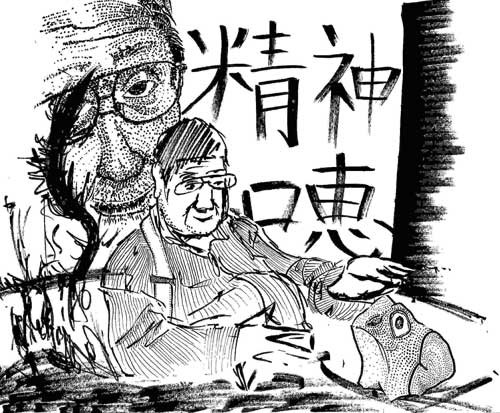
Turning Japanese (Richard Terrell)
Old book. It’s the smell that is granted to the books that have endured years of spine bending, dog earring use. It’s the smell of authenticity that cannot be reproduced. It’s a smell that reminds you of your youth and tells you to hold on to it while you can.
This smell permeated the walls of the room. The moment I stepped into this sepia-colored world, my voice was humbled. It was an open home to intellectual and comical knickknacks of all types, including elderly prints that still had something important to say between their cracked, papery gums.
Scattered about, the items found a space to live, never taking more than they needed. Some resided on the floor, while others sought the shelves, and still others hung out along the walls. And I was here to interview the man responsible for it all.
After my interview, I sat down to write my column. I had two pages of facts and about 600 words at my disposal. I started planning a nonfiction story where I, a reporter, would stumble upon a strangely captivating office home to an even stranger person who at first would seem nonsensical but through time would reveal that he was truly a wise and shining example of humanity.
But then I realized that all of these facts weren’t any of the reasons I thought that Professor John Lewis was interesting.
Sure, they were the evidence of his life and proof of his individuality, but they were none of the things I knew when I first met him. They’re not what I remembered about him. For those of you cringing at my journalistic approach, I promise I’ll give you those facts that you crave sometime. But for now, I want you to meet somebody.
It’s the first class. The room is nearly empty because half of the students figured we wouldn’t have the class on a lab day. In walks Mr. Lewis. Not intending to draw any attention to himself, he takes a seat against the wall on the other side of the classroom.
Soon, our professor had greeted the class and proceeded to walk from desk to desk, addressing each student. As she was speaking only in Japanese, most of us displayed bewildered expressions and failed miserably at an attempt to communicate. Her thorough inspection seemed to uncover a problem.
A Japanese textbook and workbook are required for JAPN 1401, and apparently the bookstore had run out of the workbooks. After firmly instructing us in Japanese, the teacher switched over to English, explaining that if we didn’t have our assigned books today then we’d better find them fast.
At this statement, Lewis jumped in his seat, grabbing his workbook and clutching it closely to himself as his gaze nervously shifted from the students sitting closest to him. He was only joking.
Lewis continued to divulge his surprisingly jovial spirit throughout the following weeks. He always spoke in a clear and projecting voice whether he had the right or wrong answer. He made mistakes with grace, not letting his words trail away in self-defeat and always laughing at himself when necessary. He reminded me of a kid receiving instruction before negative notions of education systems were produced; someone who’s excited about learning instead of projecting the detached, perennially bored milieu that some students project.
But even more surprising is that Mr. Lewis is a 64-year-old professor of English. A person like this is a rarity on the student end of a classroom. Naturally, questions begin to formulate in my mind. Who was he? Where did he come from? And, most importantly, why was he taking a language course in Japanese?
I now have answers to all of these questions. And, as I promised, here are the facts. John Lewis’ cousin, sister and brother-in-law, niece, nephew and grandfather all have connections to Japan, ranging from business to education.
When he was in junior high, he went to New York City to attend a play on a class field trip and afterwards he went to a Japanese restaurant. He’s been a fan of Japanese culture ever since. He used to write film reviews on Japanese films.
Though he’s a professor of American literature here at SMU, he acknowledges the Japanese influence on the “modern” American. He’s always wanted to go to Japan and to learn the language. Despite previous attempts, he is now taking the class that life so conveniently placed before him.
Needless to say, he’s a rare and interesting person. I couldn’t begin to write his amazing story, so meeting him will have to do for today.
I recall an exercise our professor had us do in class. We had to go around the classroom and introduce ourselves to each other. I remember approaching Lewis sensei saying, “Hajimemashite desu. Doozo yoroshiku.” (How do you do? I’m Terrell. Nice to meet you). I meant every word.








